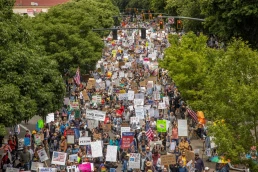What worked, what didn’t—and what about Gaza?
By RJ Eskow, The Zero Hour Report
The “after-action review” is an exercise that the left’s most organized opponents—in business, the military, and law enforcement—conduct on a routine basis. For activists, the same discipline can be used to focus and improve future organizing efforts.
These debriefs typically begin by addressing what worked well. For people who organize demonstrations, just showing up is a win. Nothing builds the spirit and optimism of a movement more than face-to-face gatherings. It’s uplifting and energizing to be with like-minded people.

Large demonstrations become instant communities. They build hope and strengthen the bonds of solidarity. Social media, while often useful, can never replace this human connection.
The revolution will not be digitized.
Wins and Losses
Last weekend’s “No Kings” was a great success in many ways. It was one of the largest political protests in American history, involving millions of people. It was also highly decentralized, with demonstrations in more than two thousand US communities. That created an enormous opportunity to educate, organize, and mobilize.
But getting people to show up is only part of an activist’s job. The other is to organize them around a coherent set of principles, goals, and messages. How did “No Kings” do on that score? That’s difficult to quantify but, based on press coverage and social-media images, the results on that score are decidedly mixed.
It’s Not About Trump
I’ve looked at hundreds of signs from the protests—possibly thousands—and found a shortfall in substantive, left-based critiques. One notable exception: a fair amount of messaging was pro-immigrant and opposed to ICE’s draconian behavior. This was especially evident in places like Los Angeles, where protests seemed to include many immigrants and immigrant defenders.
Most signs seemed to insult Trump, however, either as a person or as the personification of Nazism—and sometime both. This is poor messaging for a movement. It implies that the problems confronting our nation reside in one individual. That’s the messaging the Democratic Party has used for the last ten years, with disastrous results.
Regrettably, many signs also repeated the old trope that Trump is a puppet of Vladimir Putin—often relying on the homophobic imagery that has long characterized these “Trump hearts Putin” attacks.
The crowds that gathered for “No Kings” were ripe for a message that affirmed economic justice, demanded real democracy (with big-donor money out of politics), and called for an end to oligarchic rule.
There isn’t much evidence that a message of this kind was delivered.
Gaza’s Ghost
There was also a ghost at these demonstrations: the ghost of Gaza. The bombing and mass starvation of its people was scarcely visible.
How could millions of self-described progressives show up at a demonstration—one that explicitly rejects fascism—without mentioning the mass genocide that is now underway with our country’s active military support? Nor was there any mention of America’s implicit support for Israel’s attack on Iran or its other military adventures around the globe.
It’s like protesting Hitler without mentioning the Holocaust or the invasion of Poland.
In one sense, I understand—or imagine that I do. The protest’s organizers are closely aligned to the Democratic Party, which bears considerable responsibility for the current state of affairs. Furthermore, many Democratic voters have internalized the national security rhetoric of their party’s leadership. It’s easy to believe that they would want to avoid issues they consider divisive—
—even though they aren’t. (69 percent of Democratic voters now express unfavorable views of Israel, for example.)
Innocence is Not an Excuse
Democrats have been vocal about misinformation on social media, and it was certainly plentiful in the wake of these demonstrations. But social media also gives us unprecedented access to images of genocide. That means each of us bears more moral responsibility for our government’s actions than ever before. We can no longer say we didn’t know what it was doing.
Besides, “innocence” is not an excuse. As James Baldwin wrote, “it is not permissible that the authors of devastation should also be innocent. It is the innocence which constitutes the crime.”
Evolution
Protests are opportunities to educate the public—to explore ways of improving people’s lives in this country and around the world.
The organizers of “No Kings” deserve applause for their spectacular success in driving turnout. But activists don’t exist just to organize. The goal of activism is to organize for change—not a return to the status quo of previous administrations.
This movement is ready for the next step in its evolution. It’s time to develop and articulate an agenda for genuine transformation. developed in collaboration between organizers and protestors.
An agenda like that imbues the act of protest with deeper meaning. It gives movements the inspiration and resilience they need to survive and grow. It transfigures protesters as they work to transfigure the world.
And it leaves no one behind.
Recent Posts
New Addition to List of Nuclear Near Catastrophes
February 25, 2026
Take Action Now Debris flew for great distances — many times the distance of 270 meters to a nuclear reactor and nuclear storage facility.By David…
Gavin Newsom’s last budget belies his ‘California for All’ pledge
February 24, 2026
Take Action Now Yet, even as the state is poised to lose billions in federal funding, and millions of Californians are losing access to health care…
Israel and American Hawks are Pushing U.S. to Iran War With Catastrophic Consequences
February 23, 2026
Take Action Now At the World Health Assembly in May, member states may endorse an unprecedented strategy declaring that health is not a cost – but…
A Child’s View of the Attack on Venezuela. And a Peace Flotilla
February 23, 2026
Take Action Now Fabricio said that he and his family went out of their building and saw many people also going outside, running around, and kids…




